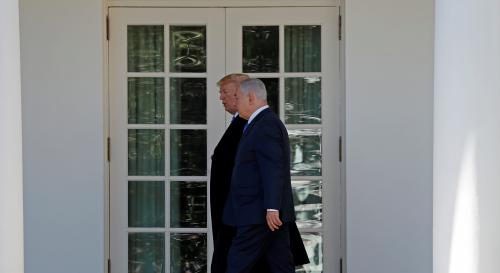Many Israelis really don’t care whether the United States moves its embassy to Jerusalem, writes Shalom Lipner. To be sure, a rare consensus of Israeli Jews endorses Jerusalem as their nation’s capital. If you engage Israelis in conversation, however, many of them express ambivalence about the embassy question. This piece originally appeared in Politico.
Presidents are used to receiving unsolicited advice. Here’s something for President Donald Trump to ponder as he packs his bags for Israel: Many Israelis really don’t care whether the United States moves its embassy to Jerusalem.
Latest reports now suggest that Trump has decided to forestall such a move for the foreseeable future. His path to this destination, after indications that he would eschew the example of all his predecessors, has been tortuous.
Celebrating Israel’s 69th independence day at the White House, Vice President Mike Pence recently reprised administration rhetoric on the matter. “The president of the United States, as we speak,” he told applauding partygoers in the Indian Treaty Room, “is giving serious consideration into moving the American Embassy in Tel Aviv to Jerusalem.” Secretary of State Rex Tillerson struck a more tentative figure over the weekend, possibly foreshadowing Trump’s plans to indeed exercise his presidential waiver and leave the embassy where it stands. When Tillerson tried passing the buck, suggesting that Israel might view the move as “perhaps a distraction” to a peace initiative, Prime Minister Benjamin Netanyahu fired back that “the contrary” was in fact true. Adding to the confusion, U.S. Ambassador to the United Nations Nikki Haley told the Christian Broadcasting Network on Tuesday, “Obviously, I believe that the capital should be Jerusalem and the embassy should be moved to Jerusalem because if you look at all their government is in Jerusalem. So much of what goes on is in Jerusalem and I think we have to see that for what it is.”
To be sure, a rare consensus of Israeli Jews endorses Jerusalem as their nation’s capital. They feel strongly that all friends of Israel—first and foremost among them, the United States—should also confer this status on the original City upon a Hill. In their eyes, documents like last month’s UNESCO resolution, which branded Israel as an “occupying Power” in Jerusalem, are not only prejudicial and offensive, but they fly in the face of Israel’s bona fide legal and historical rights in the holy city.
If you engage Israelis in conversation, however, many of them express ambivalence about the embassy question. While they believe unabashedly that all foreign missions should be situated in Jerusalem, they largely reject any portrayal of this project as some form of “concession” to Israel. Few would be willing to proffer any substantial quid in return for what is regarded as little more than a symbolic quo.
From an Israeli perspective, moving the U.S. Embassy would simply correct an injustice and affirm existing reality. Beyond that, it would be of scant practical importance. Today’s Jerusalem is a cosmopolitan venue, a tourist mecca bustling with cultural activity. Home to Israel’s “White House,” its Supreme Court, its Parliament and almost all institutions of its government, Jerusalem hosts world leaders on a daily basis. They stay in its grand hotels and dine at its critically acclaimed restaurants. Leaving aside the mundane concerns of its residents, Jerusalem, by all accounts, is managing pretty well. If anything, it is members of the diplomatic corps who would be the primary beneficiaries of the embassy’s relocation, spared the need to travel back and forth from Tel Aviv to conduct their official business.
Nothing prevents the United States from promoting its swanky consulate in Arnona—a neighborhood in uncontested, western Jerusalem—to embassy class. Even the Russians, who “view West Jerusalem as the capital of Israel,” would be hard-pressed to object. Congress already laid the groundwork for the upgrade over two decades ago, when it passed the 1995 Jerusalem Embassy Act. (Ironically, the other U.S. compound in Jerusalem, on Agron Road, already functions as a de facto embassy to the Palestinians.) And politics notwithstanding, everybody acknowledges that Jerusalem is the seat of Israeli power.
But truth be told, the formalities of American recognition of Jerusalem as Israel’s capital are overrated. The Israeli government insists that the Palestinian Authority accept its right to exist as a state of the Jewish People; otherwise, Palestinians will surely persist in their efforts to defeat a still “illegitimate” Israel, and the conflict will continue to defy resolution. When successive U.S. administrations pretend that Tel Aviv is the capital of Israel—or that Israel has no capital at all—they merely insult their Israeli friends and alienate other well-wishers of Israel. The same holds true when senior administration officials waffle about whether the Western Wall, the Second Temple remnant where Jews congregate daily in prayer, is situated in Israel. These grievances are emotional, but not existential, especially since Israel has no intention to either demote Jerusalem’s preeminence or surrender the Wall. Ending this fallacy would make Israelis feel better, and they will certainly appreciate the gesture, but it will change almost nothing in their lives.
If the president wants to land in Israel bearing gifts, there are plenty of other things that take rightful precedence for Israelis anyway. He can escalate pressure on the Palestinian Authority until it halts the scandalous payment of salaries to convicted killers of Israelis. He can grant a coveted visa waiver for Israelis traveling to the United States. He can act to ensure Iran’s meticulous compliance with all conditions of the nuclear deal it signed with the P5+1, and the enforcement of all outstanding sanctions against the regime in Tehran. He can even give Israel greater latitude to build new homes in Jerusalem itself.
Trump is by all means welcome to heed the overwhelming, bipartisan call of the U.S. Congress and move the embassy to Jerusalem—if not on this trip, then at any time of his choosing. He would be sending a signal that the United States respects its ally’s choice of its own capital and that it won’t be deterred by threats of violence. Other countries could then follow in his footsteps. Hopefully, with Jerusalem no longer held hostage to peripheral machinations, he might also pave the way to genuine progress toward regional peace.
He could authorize the move because he wants to keep his campaign promise, because America prides itself in doing the honorable thing or just because it makes sense. But he shouldn’t do it as a misplaced favor to the people of Israel. They can live without it. Especially now, in light of new allegations about Trump sharing confidential data with Russia, it’s clear that efforts to build Israeli confidence in his leadership can be invested more intelligently.
The Brookings Institution is committed to quality, independence, and impact.
We are supported by a diverse array of funders. In line with our values and policies, each Brookings publication represents the sole views of its author(s).











Commentary
Why Israelis don’t care whether the U.S. moves its embassy to Jerusalem
May 19, 2017